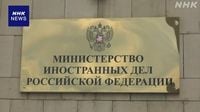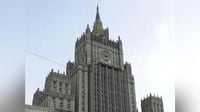In a significant escalation of military tensions in Northeast Asia, the Japanese Ground Self-Defense Force (GSDF) announced on April 10, 2025, that it will conduct its first domestic anti-ship missile firing drills in Hokkaido this June. This announcement has drawn sharp criticism from Russia, which has labeled the planned exercises as "provocative military actions" that threaten regional stability.
The GSDF's upcoming drills will involve the missile unit of the Northern Army, based in Sapporo, firing Type 88 surface-to-ship guided missiles. This marks a notable shift for Japan, which has traditionally conducted such exercises in cooperation with allies like the United States and Australia. The decision to hold these drills domestically is seen as a response to heightened security concerns in the region.
On April 17, 2025, the Russian Foreign Ministry lodged a formal protest with the Japanese Embassy in Moscow. The ministry asserted that the drills are unacceptable, claiming they pose a potential threat to Russia's security due to Hokkaido's proximity to Russian territory. The statement from the Russian government emphasized that such actions could escalate tensions in the Asia-Pacific region, stating, "Russia has the right to take necessary measures to counter threats to its security in the Far East."
As the geopolitical landscape continues to shift, Japan's decision to enhance its military capabilities has sparked discussions about its implications for regional security. Experts suggest that the drills could be interpreted as a move to strengthen Japan's defense posture amid growing concerns over North Korea's missile tests and China's assertive military activities in the region.
The backdrop of these developments includes a series of military exercises by both Japan and its allies, aimed at improving readiness and deterrence capabilities. The GSDF's announcement aligns with Japan's broader defense strategy, which has been evolving in response to changing security dynamics. In recent years, Japan has taken steps to bolster its military capabilities, including increasing its defense budget and enhancing cooperation with the United States.
In light of these developments, the upcoming drills in Hokkaido are expected to draw significant attention both domestically and internationally. Japan's government has emphasized the importance of maintaining peace and stability in the region, but the Russian response highlights the delicate balance of power in Northeast Asia.
The situation remains fluid, with analysts closely monitoring the reactions from both Japan and Russia. As tensions rise, the potential for miscalculation or misunderstanding increases, underscoring the need for clear communication and diplomatic efforts to de-escalate the situation.
In conclusion, the planned anti-ship missile drills by the Japanese Ground Self-Defense Force in Hokkaido represent a critical moment in regional security dynamics, reflecting Japan's evolving defense posture in response to perceived threats. As both nations navigate this complex landscape, the international community will be watching closely for any signs of further escalation or potential avenues for dialogue.






